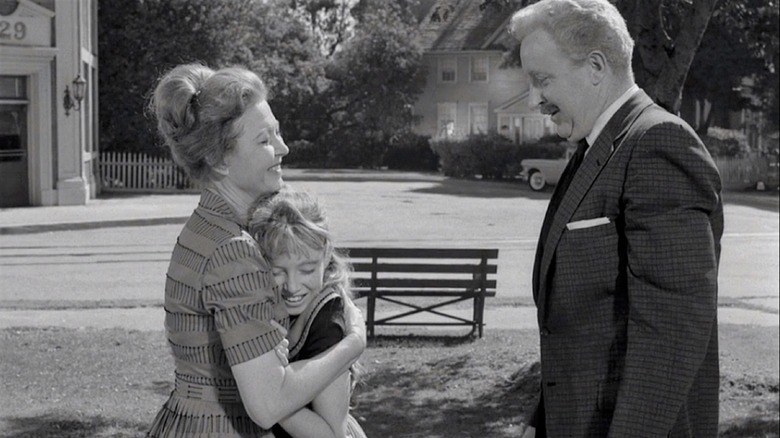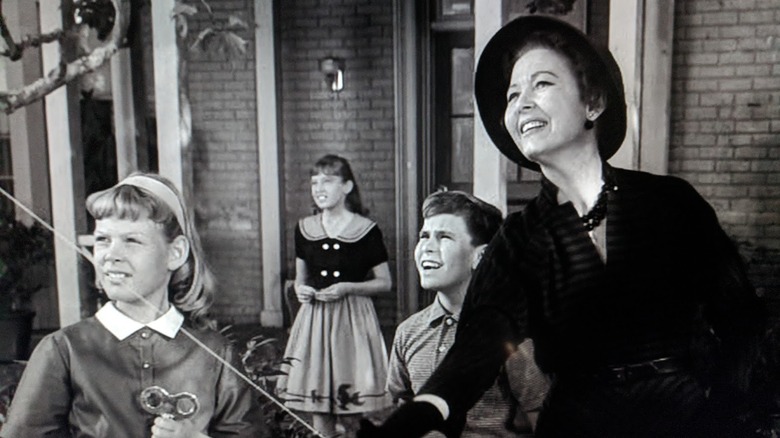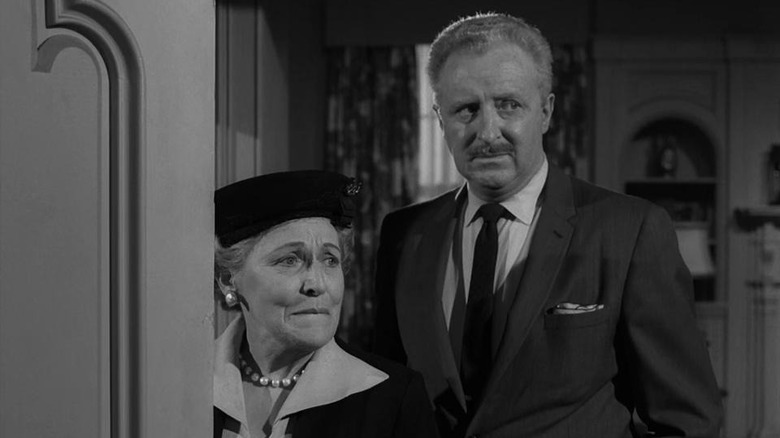Why Ray Bradbury Only Wrote One Episode Of The Twilight Zone
We may receive a commission on purchases made from links.
In May 1962, the "Twilight Zone" episode "I Sing the Body Electric" aired, with generally positive reception. The season 3 episode, which centers around a father who buys a robot grandmother for his three children, is rarely ranked at the top of fans' list of best-ever episodes, but it's never ranked at the bottom either. "It's a pleasant story," writes Marc Scott Zicree in the official companion book for the show, "But somehow one feels that it was meant to be more."
For fans of the episode's writer, Ray Bradbury, it's a little disappointing that this was the only "Twilight Zone" episode ever to be directly penned by him. The guy is one of the most popular sci-fi writers of all time, with the show itself clearly taking note. Classic episodes like "Walking Distance" and "A Stop at Willoughby" included shoutouts to him, in reference to how similar the episodes' premise was to what Bradbury's stories would feature. Show creator Rod Serling once listed Bradbury as one of his favorite-ever authors; the two were of the same generation, grew up in similar backgrounds, and explored a lot of the same ideas with their fiction.
Some would say Serling used a little too many of Bradbury's ideas, but that didn't seem to be a dealbreaker for Bradbury in the show's early seasons. When the novelist submitted his screenplay to the show for the episode "Here There Be Tygers," an adaptation of his 1951 short story, he included in his cover letter: "As soon as you want me to, I'll start on another for you. I have several weeks of extra time starting now." But the screenplay was rejected, and proved to be the first of several disagreements that led to the end of his and Serling's friendship.
A little too beautiful, a little too expensive
So, why didn't Bradbury turn out to be a good creative fit for the show? Serling explained a bit of it in a 1975 interview (as quoted in Marc Scott Zicree's "The Twilight Zone Companion"), saying that Bradbury was "a very difficult guy to dramatize, because that which reads so beautifully on the printed page doesn't fit in the mouth — it fits in the head." Bradbury's dialogue was often poetic and impressive, but it's the sort of thing that'd sound awkward coming out of a real person's mouth. There are sci-fi writers like Ursula K. Le Guin who place a lot of importance on how the text sounds when spoken aloud, but Bradbury wasn't one of them. The result was that he was a much better novelist than he was a screenwriter.
Then there was the sheer scale of Bradbury's imagination, which often led to short stories that were sort of impossible to film without a massive budget. Much like how "Doctor Who" is often at its best when confined to a single (cheap) location, many of the best "Twilight Zone" episodes were filmed within just one or two sets, with most of the fantastical elements being implied or shown sparingly. For Bradbury's "Here There Be Tygers," which prominently featured a spaceship, a mobile oil drill, monsters, volcano eruptions, lightning storms, and so on, the story was just too expensive to properly bring to life on a 1961 CBS budget. "Any one of those I would have tackled without any particular trepidation," said the show's producer Buck Houghton, "but two of them would have been a worry and three of them would have been a deal-breaker."
A friendship, dissolved
Although Radbury's screenplay for "I Sing the Body Electric" was accepted and produced by the show, Bradbury still seemed discontent with how things turned out. As LitHub reported, the author was bothered by the show's decision to cut the scene where the robotic grandma reveals her true nature to the kids. It was a moment that, for Bradbury, "diminished the essential difference between human and automaton on which the story hinges."
This disagreement came at the end of several years of growing suspicion from those in Bradbury's circles that Serling was taking perhaps a little too much of his stories for his episodes without much credit, blurring the lines between "inspired by" and "stealing from." Their relationship hit a low point in 1962 when Bradbury wrote that "Rod is a Johnny-Come-Lately, who will come and go and be forgotten in the [sci-fi] field."
This prediction did not age well, but there was an element of truth in it: "The Twilight Zone" has never been quite as original as a lot of viewers assume. Nearly every crazy concept or plot twist had been borrowed, officially or otherwise, from short stories written long before. Bradbury seemed to feel that all the acclaim for Serling was a little unearned, that he was getting credit for taking the ideas of better writers and executing them without as much skill. When Serling's show cut the most thematically interesting part of "I Sing the Body Electric," that seemed to reinforce Bradbury's perception of him, and damaged their relationship past the point of no return. As Bradbury wrote in 1962:
"As for our friendship, it is, of course, now officially over ... I can only hope and promise no one will, in future, ask me about 'The Twilight Zone.'"


